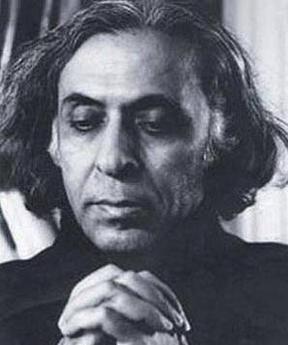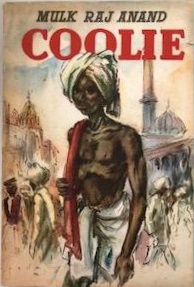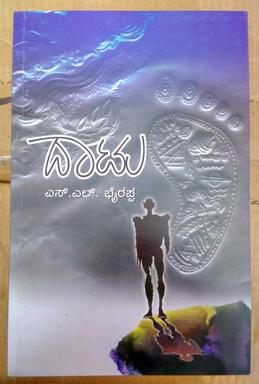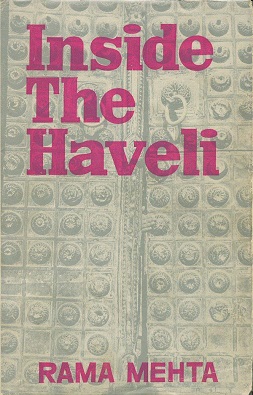
Rasipuram Krishnaswami Narayanaswami, better known as R. K. Narayan, was an Indian writer and novelist known for his work set in the fictional South Indian town of Malgudi. He was a leading author of early Indian literature in English along with Mulk Raj Anand and Raja Rao.

Mulk Raj Anand was an Indian writer in English, recognised for his depiction of the lives of the poorer class in the traditional Indian society. One of the pioneers of Indo-Anglian fiction, he, together with R. K. Narayan, Ahmad Ali and Raja Rao, was one of the first India-based writers in English to gain an International readership. Anand is admired for his novels and short stories, which have acquired the status of classics of modern Indian English literature; they are noted for their perceptive insight into the lives of the oppressed and for their analysis of impoverishment, exploitation and misfortune. He became known for his protest novel Untouchable (1935), which was followed by other works on the Indian poor such as Coolie (1936) and Two Leaves and a Bud (1937). He is also noted for being among the first writers to incorporate Punjabi and Hindustani idioms into English, and was a recipient of the civilian honour of the Padma Bhushan, the third-highest civilian award in the Republic of India.

Raja Rao was an Indian-American writer of English-language novels and short stories, whose works are deeply rooted in metaphysics. The Serpent and the Rope (1960), a semi-autobiographical novel recounting a search for spiritual truth in Europe and India, established him as one of the finest Indian prose stylists and won him the Sahitya Akademi Award in 1963. For the entire body of his work, Rao was awarded the Neustadt International Prize for Literature in 1988. Rao's wide-ranging body of work, spanning a number of genres, is seen as a varied and significant contribution to Indian English literature, as well as World literature as a whole.

Jayanta Mahapatra was an Indian poet. He is the first Indian poet to win a Sahitya Akademi award for English poetry. He was the author of poems such as "Indian Summer" and "Hunger", which are regarded as classics in modern Indian English literature. He was awarded a Padma Shri, the fourth highest civilian honour in India in 2009, but he returned the award in 2015 to protest against rising intolerance in India.

P. Sachidanandan, who uses the pseudonym Anand, is an Indian writer, writing primarily in Malayalam. He is one of the known living intellectuals in India. His works are noted for their philosophical flavor, historical context and their humanism. He is a recipient of the Sahitya Akademi Award and three Kerala Sahitya Akademi Awards. He is also a recipient of Ezhuthachan Puraskaram, Vayalar Award, Odakkuzhal Award, Muttathu Varkey Award, Vallathol Award and Yashpal Award. He did not accept the Yashpal Award and the Kerala Sahitya Akademi Award for Novel.
Indian English literature (IEL), also referred to as Indian Writing in English (IWE), is the body of work by writers in India who write in the English language but whose native or co-native language could be one of the numerous languages of India. Its early history began with the works of Henry Louis Vivian Derozio and Michael Madhusudan Dutt followed by Rabindranath Tagore and Sri Aurobindo. R. K. Narayan, Mulk Raj Anand and Raja Rao contributed to the growth and popularity of Indian English fiction in the 1930s. It is also associated, in some cases, with the works of members of the Indian diaspora who subsequently compose works in English.

Thakazhi Sivasankara Pillai, popularly known as Thakazhi after his place of birth, was an Indian novelist and short story writer of Malayalam literature. He wrote over 30 novels and novellas and over 600 short stories focusing on the lives of the oppressed classes. Known for his works such as Kayar and Chemmeen, Pillai was a recipient of the Padma Bhushan, the third highest Indian civilian award. He was also a recipient of the Jnanpith Award, India's highest literary award, awarded in 1984 for the novel Kayar.
Indian English poetry is the oldest form of Indian English literature. Henry Louis Vivian Derozio is considered the first poet in the lineage of Indian English poetry followed by Rabindranath Tagore, Sri Aurobindo, Sarojini Naidu, Michael Madhusudan Dutt, and Toru Dutt, among others.
The Sahitya Akademi Fellowship is a literary honour in India bestowed by the Sahitya Akademi, India's National Academy of Letters. It is the highest honour conferred by the Akademi on a living writer, the number of fellows at no time exceeding 21. Elected from among writers thought by the Akademi to be of acknowledged merit, the fellows are sometimes described as the "immortals of Indian literature."

Coolie is a novel by Mulk Raj Anand first published in 1936. The second book written by Mulk Raj Anand, Coolie reinforced his position as one of India's leading English authors. The book is highly critical of British rule in India and India's caste system. The plot revolves around a 14-year-old boy, Munoo, and his plight due to poverty and exploitation aided by the social and political structures in place. Anand here tries to break the traditional way of life.

The Village is a novel by Mulk Raj Anand first published in 1939. This book was the first of a trilogy that included Across the Black Waters and The Sword and the Sickle. The plot centers on India's political structure, specifically the British rule and the independence movement. The novel revolves around Lal Singh a peasant in the Punjab, his antics going against social norms while in the village, his subsequent enrollment in the army and his troubles in the army, culminating in his return to the village.
Kainikkara Padmanabha Pillai (1898–1976), popularly identified as Swathithirunal Kainikkara Padmanabha Pillai after his magnum opus, Swathithirunal, was an Indian author of Malayalam literature, actor, speaker, teacher and thinker. He was known for his plays which dealt with themes such as patriotism, sacrifice and justice and his characters showed heroism, showing influence of William Shakespeare. Kerala Sahitya Akademi awarded him their annual award for drama in 1970. He was also a recipient of the Kalyani Krishna Menon Puraskaram.
Malathi Rao is an Indian writer. She won the Central Sahitya Akademi award for her English language novel Disorderly Women in 2007.

Across the Black Waters is an English novel by the Indian writer Mulk Raj Anand first published in 1939. It describes the experience of Lalu, a sepoy in the Indian Army fighting on behalf of Britain against the Germans in France during World War I. He is portrayed by the author as an innocent peasant whose poor family was evicted from their land and who only vaguely understands what the war is about. The book has been described as Anand's best work since the Untouchable.
In Lalu's tragedy lied the tragedy of the Indian village and Anand dramatizes a poignant truth: to disposses any one of land is to deny him an identity.—Basavaraj Naikar

Daatu is a novel by Kannada writer S L Bhyrappa for which he was awarded the Sahitya Akademi Award for the year 1975. The Book has story which goes through the complex caste system that is deep rooted into Indian society demonstrated through the characters. This book has been translated to 14 major Indian Languages. The novel name indicated the crossing over the boundaries of castes and colors.
Bhabani Bhattacharya was an Indian writer, of Bengali origin, who wrote social-realist fiction. He was born in Bhagalpur, part of the Bengal Presidency in British India. Bhattacharya gained a bachelor's degree from Patna University and a doctorate from the University of London. He returned to India and joined the diplomatic service. Bhattacharya served in the United States, to which country he returned as a teacher of literary studies once he had left the service. He taught in Hawaii, and later in Seattle. In his mid-thirties Bhattacharya began writing fiction set in historically and socially realistic contexts. He wrote in English, his chosen medium following the advice of two prominent literary figures.

Inside the Haveli is an English-language novel written by Rama Mehta. For this novel Mehta was conferred Sahitya Akademi Award in 1979. The story of the novel revolved around a young girl from Mumbai, India. She marries a son of a former Indian prince and post-marriage she relocates to Udaipur, Rajasthan.
Madhukar Krishna Naik was an Indian scholar of Indian literature in English. He died in 2014.
Razia Sajjad Zaheer was an Indian writer in the Urdu language, a translator, and a prominent member of the Progressive Writers Association. She won the Uttar Pradesh Sahitya Akademi Award as well as the Soviet Land Nehru Award.

Rao Bahadur Hargovinddas Dwarkadas Kantawala was an Indian Gujarati language writer, editor and researcher from British India. He is known for his research and editing works on medieval Gujarati literature. He was the president of the sixth session of the Gujarati Sahitya Parishad.












